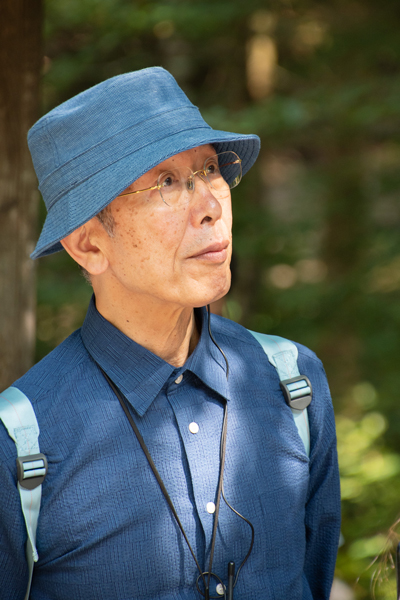Flexibility Leads to Mental Freedom
May 2024

Removing the Yoke from the Ox
Around this time every year, I am fondly reminded of the old days, when I would help with preparations for planting rice seedlings by doing things like plowing up the paddies, filling them with water, and smoothing them over. I have memories from around age 10 to 14 of leading, by the ring through its nose, the ox that cultivated the rice paddies. I felt afraid when sprayed by the ox’s hard breath and when I heard its loud snorting, but for us, that ox was an important member of the family, living under our roof. Indeed, the first time I visited Founder Niwano’s birthplace in Suganuma, Niigata Prefecture, I opened the front door and stepped into the dimly lit house to be greeted by the smell wafting in from the stables. That memory is still fresh in my mind.
To cite a passage from the Sutta Nipata, a collection of Shakyamuni’s sayings, “Flexibility means removing the yoke from the ox.” As someone who spent some years working and living with oxen and horses, this passage deeply impresses me, vividly reminding me of my close interaction with the oxen and horses that we kept and the mind of consideration born from keeping them. The yoke is an implement attached to the ox while it plows the fields. When the farm work is finished and the time comes to remove the yoke from the ox’s shoulders, doing so must be like telling the ox “Thanks for working so hard again today,” expressing gratitude and being kind to the ox. We can condense this into one word, “flexibility,” which means “a kind and peaceful demeanor.” And just as the farmer shows consideration for the ox, who he treats like a member of his family, I think this passage of the Sutta Nipata is similarly imbued with Shakyamuni’s wish that all human beings be kind and peaceful.
Removing Attachments
Seen from a different angle, the phrase “removing the yoke” symbolically teaches us the importance of living our lives by removing the things that are tying us down.
We human beings have minds with many attachments, such as our opinions and desire for things, that prevent us from leading lives of complete mental freedom, without attachments, like animals and plants. Although we may not be able to attain a level of free and unhindered concentration like the buddhas and bodhisattvas do, these attachments produce sufferings, and therefore we should all try, as much as possible, to remove the attachments from our minds that cause irritation so that our daily lives are relaxed and calm.
The Edo period Zen master Shido Bunan (1603–76) said, “To practice being a buddha is to not think about anything,” and “it is fine to do everything with the mindset of not thinking about anything at all.” He was always careful to avoid having attachments to anything. Here is a story about him that illustrates this.
There was a wealthy man who respected Zen master Shido Bunan so much that he arranged for him to stay in a hermitage in the village where he lived. But one day, the man discovered that his daughter was pregnant. When he asked his daughter who the father was, she lied and said, “It’s the Zen master.” The man was so angry that he immediately went to Shido Bunan, hurled insults and rebukes at him, and chased him out of the village. After a while, though, his daughter confessed the truth, saying, “I was afraid of being punished, so I thought it would be better to say it was the Zen master, who is respected by everyone.”
The man immediately went to call upon Shido Bunan and tearfully apologized to him. According to written records, the Zen master replied with a pleasant smile and laughter, saying that no one is to blame, not in the least. Zen master Shido Bunan was certainly someone who was kind to everyone, full of compassion, and in command of a mind of flexibility and freedom from attachments.
In fact, “Shido Bunan” is a Zen phrase that means “There is nothing difficult about the Way leading to the Truth.” In other words, all you have to do is avoid forming attachments to liking one thing and disliking another, or to your own ideas about everything, and that is good enough; that is the Buddha Way.
Regarding flexibility, Founder Niwano said, “If, at first, you only superficially adopt the ‘keep on smiling’ philosophy, that’s all right. Just keep in mind that you are smiling to become more flexible, and it will naturally sink into your spirit.” Therefore, since we hope to become people with mental freedom and flexibility like the Buddha, let’s try, as best we can, to accept whatever happens with smiles on our faces.




